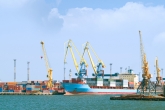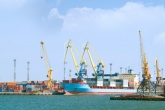UK recycling industry braced for impact as Chinese crackdown begins
Chinese restrictions on imports of 24 grades of solid waste were adopted on Monday (1 January) and are set to cause significant discomfort in the UK recycling sector.
Complete bans, which were announced in July, will apply to a range of solid wastes, including unsorted mixed papers and post-consumer plastics. Meanwhile, from 1 March 2018, any other materials exceeding a contamination limit of 0.5 per cent will also be blocked, with the time between 1 January and 1 March effectively constituting a transition period.
Given the strict limits on contamination, these extra restrictions effectively constitute a ban, a development that will hugely affect the UK recycling industry, which currently sends about 494,000 tonnes of plastics and 1.4 million tonnes of recovered paper to China every year.
Those wondering whether the restrictions would be applied immediately appear to have had their fears confirmed, with reports emerging from China through Recycling Today suggesting that the first batches of import licenses and quota amounts for Chinese importers of waste materials have been released in greatly reduced numbers, with none going to importers of recovered fibre and only four for plastics scrap.
And even before the new rules were adopted, many exporters had already ceased shipping scrap to China due to uncertainty over how the rules will be applied and the inconsistency in the application of the new rules by Chinese customs officials, deeming the risk of being turned away at Chinese ports and being held liable for return shipping costs too high.
The effects appear to be already being felt by UK recyclers and exporters. Simon Ellin, Chief Executive of the Recycling Association, told The Guardian yesterday (2 January) that many of the association’s members were already struggling to move on certain waste materials, especially plastics, saying: “You can already see the impact if you walk round some of our members’ yards. Plastic is building up and if you were to go around those yards in a couple of months’ time the situation would be even worse.
“We have relied on exporting plastic recycling to China for 20 years and now people do not know what is going to happen. A lot of [our members] are now sitting back and seeing what comes out of the woodwork, but people are very worried.”
Alternative destinations in Asia, such as Indonesia, India, Vietnam, Cambodia and Malaysia, are being sought but while they may have the will to accept these waste materials, they certainly do not yet have the capacity to take them on in the quantities required, nor do they have the appropriate level of regulations and legal systems on waste management.
No more ‘foreign rubbish’
The Chinese crackdown on waste imports is no novelty, and forms part of a wider strategy on the part of the Chinese Government to clean up the country’s environment. China has long been seen as a repository for the developed world’s lower quality waste materials and recyclate, importing some 7.3 million tonnes of waste plastics alone from developed countries in 2016.
As a result of its manufacturing boom, started in the 1980s following the death of Mao Zedong and the ensuing limited liberalisation of its economic policy, China has been eager to accept the world’s recyclate as a valuable input into its manufacturing sector. However, due to poor regulation and monitoring and the informal nature of many reprocessing operations, the processing of waste materials caused many health and environmental problems.
And it seems that China has had enough. China announced at the start of 2017 that it had committed 252 billion yuan (£29 billion) over the next three years to sorting out its waste problem, as well as implementing the National Sword campaign in February, which targeted the smuggling of ‘foreign waste’ and resulted in a litany of rejected shipments of waste materials at Chinese ports.
It is not just imports of waste that are the subject of the crackdown, with China issuing a plan in march that requires 46 cities to carry out the mandatory separation of waste in order to make it easier to recycle by 2020, including separating hazardous wastes and kitchen waste from the primary dry recycling stream.
In a news release made by the Chinese Government’s Ministry for Environmental Protection (MEP) yesterday (2 January) it was revealed that 12 cities had adopted laws on waste sorting, with a further 24 cities having introduced work programmes pertaining to the issue.
Quality must take precedent
With the prospect of further waste materials restrictions in 2019 raised in a paper released by the China Council for International Cooperation on Environment and Development (CCICED) in December, there is now an urgent need for action if chaos in the UK recycling sector is to be averted.
Ever since the restrictions were first announced back in July, calls have been made from across the UK recycling sector for a vast improvement in the quality of the recyclate collected, either so that it is of sufficient quality to be taken by UK or European reprocessing facilities or so that it gets past the restrictive limits on contamination imposed by the new Chinese rules.
Back in October 2017, in response to a joint letter from the Resource Association, the Confederation of Paper Industries (CPI), the Environmental Services Association (ESA) and the Recycling Association, which called for high-level government action on the restrictions, WRAP CEO Marcus Gover urged UK recyclers to focus on ‘improving the quality of recycled materials’ through ‘measures such as moving away from simplistic weight-based targets’ and exploring ‘options for extended producer responsibility’ in order to safeguard the success of the whole recycling supply chain.
This stance was reiterated in November 2017 by Adrian Jackson, President of the Recycling Association, whose 'Quality First' campaign has sought to highlight the issue, following the increase of the contamination limit by the Chinese Government to 0.5 per cent, up from the originally proposed 0.3 per cent, saying: "We should be under no illusion that a 0.5 per cent contamination level will be extremely tough to meet, especially with only until 1 March 2018 to hit that requirement. From now, every part of the supply chain has to focus on quality first, so that we can continue to send secondary materials to our biggest purchaser.
"However, with plastics now banned, apart from a very small amount of post-production material, this should serve as a warning that unless we produce a quality product from other materials, we could risk losing the Chinese market altogether.”
Despite repeated calls for support from the UK Government on the matter, the Department for Environment, Food and Rural Affairs (Defra) has been slow to react, with Environment Secretary Michael Gove, whose hyperactive tenure has thus far eschewed giving serious consideration to the Chinese restrictions, admitting to Parliament’s Environmental Audit Committee (EAC) that he had “not given sufficient thought” to the possible impacts of China’s policy.








